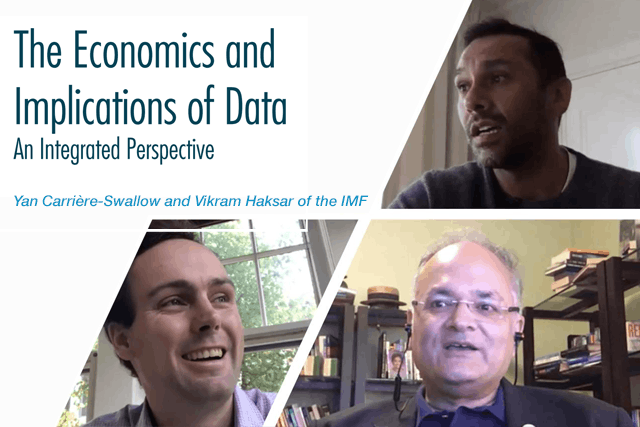Yan Carrière-Swallow
Falling costs and improvements in analytics are driving the proliferation of data across the economy. We’re seeing reforms to consumer protection, open banking regulations, as well as global data localization laws.
Data has three interesting economic characteristics, unlike other inputs:
● Data is non-rival. When agents use data it doesn’t stop others from using that same data at the same time. You can get increasing returns to data, both in scale and in scope.
● Privacy externalities. Think about a social network itself selling its users’ information to a third party. Privacy is not really about mandating less data sharing, less access, but rather granting control to individuals over their data.
● Because data is kept on interconnected networks, making it excludable is expensive. Investing in cybersecurity is a decision that firms have to make about how excludable they want to make the data they’ve acquired.
What does all this mean for macroeconomic outcomes? Here are a few of the main implications:
● Data accumulation can allow for more efficient production and innovation, with increasing returns to scale. It can also form barriers to entry that hurt competition, and undermine privacy.
● Data proliferation can promote inclusion by mitigating selection problems that plague SMEs. It can also lead to the exclusion of high-risk individuals, undermining the risk-sharing function of insurance.
● Heavier use of data-dependent systems, particularly in finance, may increase the risks in some cases, or at least shift them onto centralized service providers.
Vikram Haksar
One insight that we come away with is that these issues are all interconnected. We need data policy frameworks that balance multiple competing objectives: growth, equity, and stability.
Our concern is that the market for data is too opaque from a consumer perspective. Control and access rights over data are unclear. If we were to strengthen privacy laws, how does that impact the ability of firms to compete and innovate? With data localization requirements, would we be able to achieve the scale of data sets needed to tackle physical AI problems?
We have a growing concentration of data with incumbents building market power. Were it to be shared more widely, it would lift productivity growth in the whole economy.
From the IMF’s perspective, countries are approaching data very differently. We would argue for some international discussion about common minimum standards. This is an issue which would be quite relevant, including in a small financial model as well, but in the large financial center, like Luxembourg.
International Leadership Perspectives: “The Economics and Implications of Data” with the IMF: .
